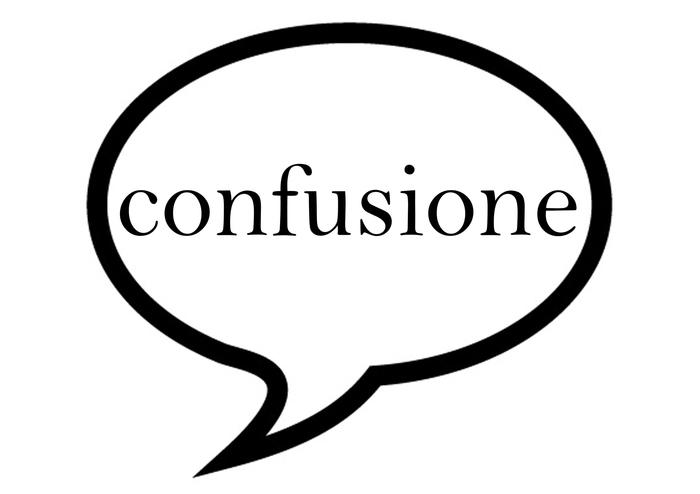'Great is the confusion under the sky: the situation is excellent': this is Confucius and it has been useful to Mao Tze Dong on the subject of the Chinese revolution.
The confusion of which Giulio Rapetti in art Mogol writes in the homonymous song sung by Battisti is different.
Here we are at the beginning of the 70s, about ten years after Mao, and we are on the side of free love (at least for him), of I love you but I also have other feelings and you must let me free because this means being transparent ' otherwise 'if you are the daughter of the usual illusion you stay and make a mess'.
We are transparent, we do not confuse.
Even if, perhaps she would argue, here you are making the confusion, with your free feelings superimposing on love for me other loves for other women.
Nothing new: every time we start touching and making a word speak, what we immediately discover is that the words are all bordering on something else.
They mean something but they also call for something else.
Or at least they can be evaluated differently depending on the point of view you choose.
Listen to "Word of the week: confusion (by Massimo Sebastiani)" on Spreaker.
For example, what is more beautiful, sweeter, more awaited than the confusion of Christmas?
The confusion of the streets invaded by the rush for gifts, of houses literally occupied by more or less extended families, of the somewhat magical, somewhat consumerist moment of the exchange of gifts, of the tables around which we gather in so many.
So expected that, at the idea that all this, or almost all of this, this year is forbidden to us, we have fallen into a deep depression.
And the confusion seems to some also that in which those who have to choose, decide and govern this phase so delicate and complex are entangled, where freedom to rejoice, move and celebrate must be tempered by the respect of essential rules for safeguarding the health and the estate of a whole system.
There was talk of confusion of messages, of proliferation of decrees and ordinances, of confusion between national and local addresses (schools open in red areas and closed in yellow areas for example).
In short, the confusion seems to be another way to photograph a moment that we just don't like, the worthy, so to speak, end of a horrible year.
Yet, as we have seen, there are also those who appreciate confusion.
In the face of Marie Kondo, the Japanese writer who turned into a bestseller, The Magic Power of Tidying, the idea that everything around us must be perfectly ordered to be able to live well, there are millions of people who swear they cannot live if not in chaos.
'In the disorder I have my order' is the ordinance sentence of the messy people all over the world, busy defending crowded desks, wardrobes that look like they came out of a horror B movie and abandoned heaps of dishes to wash.
But what does confusion mean?
The Latin origin is quite clear: from cum, that is with, together, and fusus, past participle of the verse to merge.
Then melted together, mixed.
Something fused together is not necessarily messy.
Who would define a successful cocktail, that is, well mixed, messy?
(apart from James Bond of course that the Martini Gin wanted it shaken not stirred).
Twentieth-century physics explained it to us, that (apparent) disorder and order meet.
It all depends on the glasses we put on to see the world, how blurry they are, so to speak.
The more we go into detail (particle physics) the more things seemingly confused, a cup that shatters a thousand pieces and falls to the ground, a waterfall made up of millions of particles of water that fall in disorder, a gas that spreads through the air they show quite clear rules.
The problem is that they are not what we expected, that is, they seem to tell us different things from what we see in the macro-world of everyday things.
One of the geniuses of physics of the 20th century, Ludwig Boltzman, an Austrian who committed suicide in Duino at the beginning of the 20th century, chose as an epitaph for his tomb the equation, which he revealed, of entropy which, roughly speaking, can be defined , the measure of disorder.
Certain things happen, for example the passage of heat, by mixing, by agitation, by confusion we could say.
And many greetings to James Bond.
Among other things, as explained by the physicist Carlo Rovelli, author of the best seller Seven short lessons in physics, it is one of the very few equations in physics that refers to the dimension of time, to deny it.
It is no coincidence that Boltzmann, in moments of euphoria that alternated with those of depression, liked to remember being born between Shrove Tuesday and Ash Wednesday, that is, on the border between the realm of maximum confusion and the composed, ordered and empty space to which it starts on Ash Wednesday, with which Lent, penance, fasting begins.
The King Crimson by Robert Fripp and Greg Lake, the group that was king of progressive rock and beyond, and that in 1969 sang the loss of a world to be in 1969, have chosen a completely different path, compared to Boltzmann, about epitaphs and confusion you don't know what to expect.

